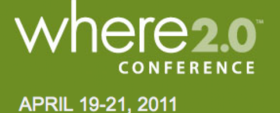When I first was reflecting on the Where2.0 2011 conference, I had the impression that there were no real highlights and hardly any new trends. Navteq was announcing their 3D cities in an attempt to catch up with Google. Microsoft are advancing their map technology and announcing some major players are to switch from Google to Bing maps. Google launched Earth Builder – a tool to bring geographic data from non-profit organizations into the cloud, directly competing with ESRI’s ArcGIS online. Hardly any breaking news here.
However, there is one trend that becomes clear: all players are entering or strengthening their crowdsourcing initiatives for building maps. Often this approach was just mentioned as incidental or sold differently to audience: Google has extended Map Maker from the remote countries to the US. Similarly, Navteq has launched a Wiki-map approach in Ethiopia, following the path taken by Google and trying this approach in remote countries first.
Microsoft launched Photosynth, a free tool on the iPhone to generate geocoded panorama images. It was not mentioned explicit but it seems it is intended to advance the Google ‘StreetView’ approach to places that cannot be covered by cars; especially indoors.
I wonder if the users are willing to do mapping efforts for the big corporations that keep the map data under a commercial license. Google is trying to shift respectively, extending the mapping efforts from India, where costs are low, to volunteers that work for free. The question is if people (and organizations) will just make sure that their home place is shown correctly or if people are indeed willing to bring the commercial maps to a new level of detail as it is seen in OpenStreetMap.


I definitely think crowd sourcing is the way to go but one big issue for startups in this area especially someone like ours is that we dont have access to the huge amount of data that Google and MS have to create good user experience. What are your thoughts on this ?
I am a cartography and GPS hobbyist, and I prefer to donate my time to OSM instead of Google or other commercial projects. I think crowdsourcing projects are a fine way to build interest in the brand, but you run into trouble when the level of crowdsourced detail is not equal across all areas, or to put it another way, if the maps are only good where the college students live.
This is certainly a problem we need to educate people on. There is only a certain amount of work one should be willing to do for a for-profit organization without compensation. People need to understand what they are participating in, and how much effort they are willing to put in to these groups for free.For example, I myself am willing to issue bug reports, and generate user feedback to private entities for the products I consume by them. But if I’m going to do full scale work, bug fixing, feature enhancement, etc. then I expect to either be financially compensated, or the work I do must be made available in an open format and under a free license.Others may draw different lines, but they need to consciously consider where the line is before they just go out and do work for free so that others can turn around and profit from them, without even providing that work back to that person in any sort of open format.
I think part of the problem is that google is free, and that people don’t have a good grasp on the difference between free as in beer and free as in speech.
<p>Google is not free. The use of the data is restricted, and the format is not available in a crunchable format.</p>